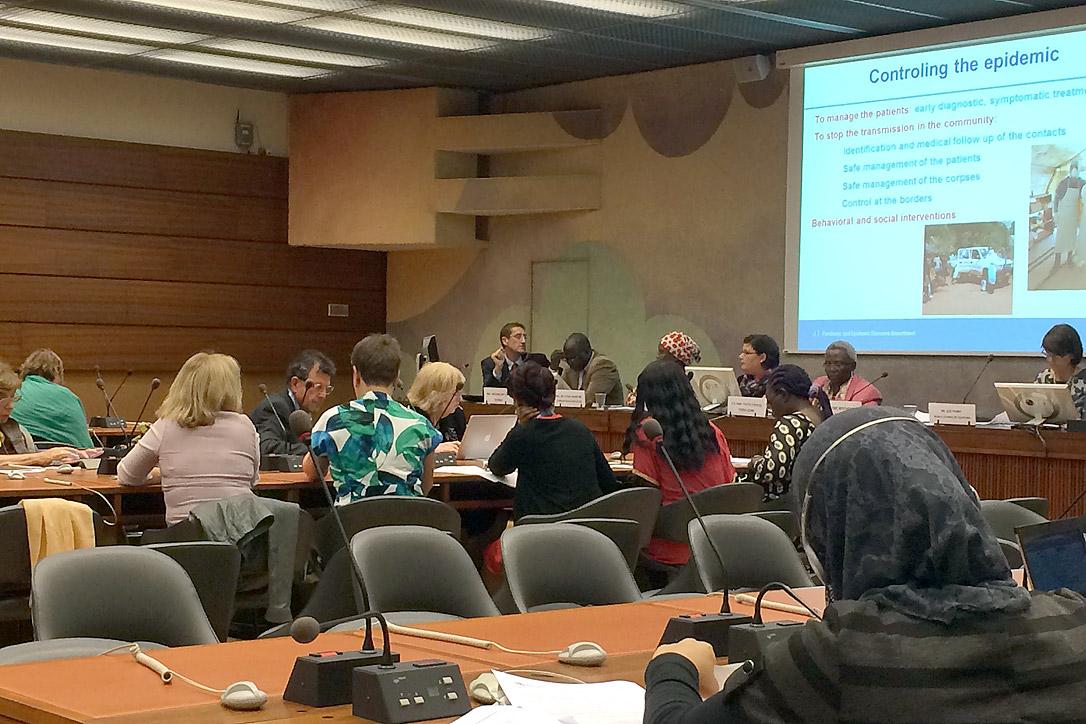Faith Groups Essential in Fighting Ebola

Side-event on Ebola Crisis during the 27th UNHR Council meeting. Photo: LWF/M. Spangler
Panel on Socio-economic and Human Rights Implications
(LWI) – Faith-based organizations and churches are essential for an effective response to the Ebola crisis in Western Africa. This was one of the messages on 22 September from a side-event on “Ebola – Socio-economic and Human Rights Implications” at the 27th session of the United Nations Human Rights Council, Palais des Nations, Geneva.
The event organized by The Lutheran World Federation (LWF), ACT Alliance and The World Council of Churches (WCC) featured ambassadors from the Ebola- affected countries of Sierra Leone and Guinea as well as the World Health organization (WHO) and faith-based NGOs such as the LWF and the WCC.
“Ebola is no longer just a public health crisis,” Yvette Stevens, Ambassador of the Republic of Sierra Leone, said. “If we do not contain it, entire communities will be wiped out”. Stigma and mass isolation have caused socioeconomic ruptures in the countries of Liberia, Sierra Leone and Guinea where the epidemic struck most.
“All existing health facilities are closed or dealing solely with Ebola,” Ambassador Stevens added. Mr. Aboubacar Cissé, representative of the Republic of Guinea, shared similar observations. “The poor population is totally powerless,” he said. “We have to act quickly”.
Effective Emergency Response
Churches and faith-based organizations are a vital part of that response, as they run many of the health facilities in the affected areas. The Lutheran Church in Liberia (LCL) also has a diaconal arm which has extensive experience in awareness raising and trauma counseling on HIV/AIDS.
LWF Area Secretary for Africa Rev. Dr. Elieshi Mungure especially highlights the effective emergency response by churches in Liberia, where the LWF Departments for Mission and Development and for World Service conducted an emergency response/disaster risk management training the previous year.
“They have worked through their overstretched health care facilities, and the local communities have gathered other resources to offer support to the affected communities”, Rev. Mungure outlines, citing also examples of good collaboration. “For example, the government built an isolation center while the church built a transit or reception center”.
“This is an outbreak we have never seen before” Dr Eric Bertherat of the WHO said. As the containment strategy includes identifying all people who have had contact with the infected person and taking care of the sick and the dead, he stressed the need to engage people through local leaders. “In many places, people do not trust science, technical or medical explanations,” he said. “But they will trust religious leaders”.
“They are trusted and command respect”
Bertherat therefore sees faith groups as crucial in the implementation of the necessary precautions. “We absolutely need more faith-based involvement for the management of cases and the tracking of contacts” he said. This would be especially important in advocating for safe funerals, as the necessary precautions to avoid further infection caused fear and apprehension among the local populations.
“The protocols in treating and burying of the deceased are traumatic,” Rev. Mungure said. “Africans have elaborated rituals for burying and mourning, which cannot be practiced. This is adding to the pain and possible denial, which may make people keep their sick ones with them as much as they can”.
Churches are also asked to help reduce stigma and rumors about witchcraft, which in some areas are believed to be the cause of the disease – with severe social and medical consequences, as people turn to traditional healing methods which might cause even more infections.
“Churches are rooted in the communities they serve, they have structures and effective communication channels on the ground and they know how to mobilize people” Dr. Sue Parry, consultant for the WCC' health and healing, summarizes. “Religious leaders know how to mobilize people, they are trusted and they command a lot of respect”.




